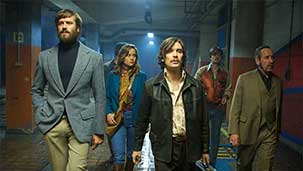Free Fire is near to perfect, and a lot of that is down to you and your co-writer, director Ben Wheatley.
A film taking place in one location, in real time, presents all sorts of challenges. For instance: how do you instill what is essentially a one act play, populated by multiple characters, with the sense that these aren’t just affectless marionettes dancing to your particular tune?
The answer to that question is Free Fire.
Two rival gangs meet in a Boston warehouse, circa 1972 (nice touch that, it really adds a French Connection/ Taxi Driver-lite ambience to the proceedings) to negotiate an arms deal. It isn’t very long before the encounter goes sideways--which results in a very dark, and often very funny, 90 minutes.
In the wrong hands something like this would either descend quickly into unintended parody, or bog down in bullet riddled corpses. But you manage to create and sustain tension, humor, a kind of absurd pathos and most importantly, a narrative rhythm that feels loose and improvisational despite the premises’ strictures.
The cast was also note perfect--Cillian Murphy, Brie Larson, Armie Hammer, Sharlto Copley, Michael Smiley all inhabit distinct, idiosyncratic characters. All of the performances mesh immaculately, despite the fact that they are often played in wildly different registers. Sharlto Copley is Sharlto Copley let run wild, while Cillian Murphy is possessed of a sardonic Irish cool that’s completely engaging. It’s difficult enough to make that combination work in a film with a much larger canvas, but to have it succeed so well, in such tight confines, is impressive.
In some ways Free Fire (intentionally or not) is a direct rebuke to Tarantino’s Hateful Eight. Both films feature groups of ill-intentioned people occupying a small space, and lots of gunfire. But other than the premise the two films couldn’t be more different. Where Hateful Eight was ponderous and often achingly slow, filled with portentous and often pretentious speechifying a la Tarantino, Free Fire is quick on its feet, with sharp writing and what feels like real people (however odd) stuck in a strange, but often deadly, circumstance.
That you managed to establish so many memorable personalities in such a brief time, with such a limited palette, speaks to a facility few people possess. It is difficult enough trying to create arcs for two or three people over months of screen time and in different settings, but to do it in one room (however cavernous) over an hour and a half of real time is impressive.
If I have one quibble it was the last 10 minutes felt a little too neatly plotted and maybe a touch rushed, but that may be down to the fact that I wanted more of this film rather than any shortcomings in the filmmaking.
Free Fire is just another example of how British film is quickly becoming the go to for what used to be the Weinstein’s bread and butter: mid-budget adult-oriented films that depend on writing and performance as well as great direction, rather than 125 million dollar budgets and a year of hype.
This is a well-crafted piece of entertainment that I wouldn’t hesitate to recommend to anyone.
Thanks Amy.
Sincerely,

Tim







